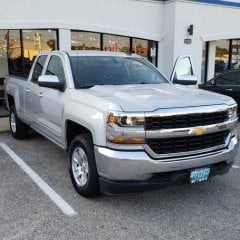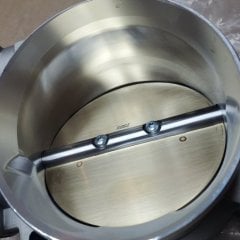-
Posts
234 -
Joined
-
Last visited
Profile Information
-
Location
United States
Recent Profile Visitors
5,146 profile views
ic3man5's Achievements
-

5.3 negative LTFT, feels sluggish
ic3man5 replied to Hans Myers's topic in 1999-2013 Silverado & Sierra 1500
See my post here, its not your exact engine/year but I was having fuel trim issues and had a vacuum leak causing negative LTFT. -

Cooling fans commanded/overheating towing
ic3man5 replied to gonzoid's topic in 2014-2018 Silverado & Sierra Troubleshooting
So the question is what is the acceptable max temperature for the L83? Is there an actual spec from GM? I know 220F is generally okay but above 230-240F seems like you are starting to push it. -

Cooling fans commanded/overheating towing
ic3man5 replied to gonzoid's topic in 2014-2018 Silverado & Sierra Troubleshooting
I haven't 100% verified it yet but I think the temperature gauge is fake in our trucks or at least seems "filtered" near 210F. Check your coolant level, radiator has known issues with pinhole leaks you won't see until the coolant is gone. -
I would inspect the lifter tick ASAP, might be damage from AFM (v4 mode) if you still have that enabled. Its not as bad as previous generation but I've seen a few people complain about it. Most of the time the drop in pressure is either a change in oil or oil filter. As long as your at or above 6 PSI you are okay and won't hurt anything. High oil pressure can be bad (especially when you see it "limit" on the high end), as the oil filter has a bypass and stops filtering at this point. Of course nothing is harmed when the filter is being bypassed unless you had a random chuck of dirt or metal slide by (not likely at all). I've seen clogged oil pick up screens lower PSI a lot (I'll flush a quart or two when the drain plug is out to flush anything in the pan).
-

2014 Silverado shudder at low speeds
ic3man5 replied to Gordon1112's topic in 2014-2018 Silverado & Sierra Troubleshooting
Manual Shift mode usually disables AFM (V4 mode) if not in 6th gear. If that is your difference do a basic tune-up and then check engine mounts. There are TSBs out there to shim the mounts and updated engine mount parts to help fix this issue also. Vacuum leaks have caused negative fuel trims (STFT and LTFT) and shutters for me at low RPM and high load. -

Shutter/Misfire under low RPM and load
ic3man5 replied to ic3man5's topic in 2014-2018 Silverado & Sierra Troubleshooting
I finally fixed my shutter! I had a shop replace my radiator (thanks GM for great radiators). Turns out I had a couple minor vaccum leaks due to hoses on the catch can I had installed becoming lose over time (originally press fit with no hose clamps). The biggest offender that actually set off the CEL was the hose on the top left hand side of the engine above/near the valve cover oil cap. It's behind some stuff so it's easy to overlook. Pull that hose with the engine on and it starts running like you are drowning it in fuel and have a super aggressive cam profile. The one under the intake throttle body seemed to be an offender also but not nearly as bad. I'm now within 2-4% negative fuel trim readings. -
Its clear you don't have an understanding on how electronics work, stop guessing here. Majority of electronics in this world don't require fans for thermal dissipation. Everything you stated here is just plain false.
-
The TCM can at a bare minimum withstand 257F constantly and it won't fry the second it goes over that. It should be able to withstand way higher but I don't have access to that information without tearing apart a T43 Module. TCC is never unlocked in the 6L80 under heavy torque load (184ft lb+) (Not accounting for bugs in the software). If you are referring to the torque converter itself its very rarely unlocked unless at WOT and near the end of the shift. See below for the shift tables:
-
Roughly about 80-85F and little to no slope (last 20 miles might be a like a 1-3 degree incline. So I'm under the test requirements for the J2807 test but I'm moving faster so its probably similar energy outputs but no way to measure it. The thing that sucks about the J2807 test is the requirements don't say anything about temperatures but it simply can't burn any fluids, which won't happen until the oil is hitting 400F+ (For a decent oil anyways, cheap oils can be close to 300F). The torque converter lock up is very aggressive in the 6L80 so that should decrease heat but the TCC is always slipping 40-100 RPM in a stock tune. I agree their risk assessment was in the benefit for a "smoother" ride over longevity. Yes I feel completely comfortable with that AND it gives the benefit of not stopping. Sometimes the time allowance simply isn't there to allow for stops or you have passengers that are hard to manage (kids / wife) and every stop means either spending more money or possibly increased crabbiness, etc. As for the diesel, I would feel more comfortable towing near the limit (Lets say 3/4 instead of 1/2) but I'd still monitor it and probably still add a transmission cooler. I was going to factor in wind resistance also but its already such a huge topic I left it out; My experience is worse case 24ft long 7/8ft tall and requires tow mirrors.
-
I agree with everything you are saying; I jumped to conclusions assuming you were just repeating OEM specs without knowledge on the subject, sorry about that. Like you said we can't really know how bad the failure point is for the TCC; GM is the only ones that would know that and even that information is incomplete. Most of my knowledge on the TCC is from tuning and knowing how poorly its implemented on the software side; It seems to be a growing trend the TCC fails as early as 60K miles even without towing. I would categorize most of us on these forums as the 0.1 percenters that actually worry about stuff like this and most won't tow at the limit and if they do, not for very long. The tow rating IMO isn't a lie technically and it can do it but not without thermals increasing beyond safe limits and the J2807 test sadly doesn't test against. My Personal experience towing 7,000lbs @ 70MPH for about 3 hours was too much for it. The temperatures on the tranny were easily hitting 230/240F and the engine RPMS (L83 5.3L) were usually around 3-4.5K. I have to take a break half way through the trip to let it cool down a bit. This is with the TCC locked at all times and increased lock up pressure on the TC so I can only imagine how much more heat would be generated without the tuning and more slipping. Removing the thermostat did help increase how long I can tow before those temperatures are hit but it still happens. That being said I can tow 5,000k all day long and temperatures stay in check. Handling, braking, MPG, and engine torque all feel a lot better when the tow rating is cut in half IMO; This rule I only apply for 1500s and gas engines (Oh how I wish I had a 2500 and a diesel). I also assume the OEMs will do just enough to cover reliability enough were it won't come back and be a PR nightmare and something attorneys can easily smash. Those of us that tow over 5,000lbs is far and in between so even if it does fail its not going to make much noise.
-
Now you are just pulling at strings without bringing anything to the conversation. Your examples aren't valid in proving your point; using a motorcycle with undersized heat dissipation relative to the engine is a horrible representation of what you are trying to prove out. Air/Oil cooled engine are not relative to this conversation by any means. Your previous example of correlating sludge to "bad" oils was also a very poor example as engine sludge is generally poor engine design or lack of maintenance. So far you have brought up the following points that have no bearing or helpfulness to the OP (which probably already made a decision at this point): -The base of the oil is super important (Its not) -Oil is bad because it can sludge up and ruin an engine (Not correlated correctly). -Air/Oil cooled engine is a great example of coolant to oil temp linear correlation (Its not). I could go on more but this is getting boring and not interesting. The fact that you can't even comprehend how much you stressed the "Importance" the base oil is laughable at best. Outside your knowledge of the type of base oil (which is creditable and vast) and being able to log thermal points on various points of the engine, your knowledge is very limited and not on topic or helpful here.
-
Not an argument here. Ring blowby is NOT the main reason oil performance degrades and change intervals need to be increased. Thermal breakdown is the number one factor, in both directions. You seem to not have a very good grasp on how thermals correlate to energy output; just because you raise the base temperature when its acting as a coolant doesn't mean the upper temperature linearly scales the same. You keep on using the main bearing temperature as your examples here but I have let to see an L83/L86 (or previous gen) let the main bearing go due to temperature; Hell they are running 1000hp to these engines and that still isn't the case. In fact its such a non-issue its a waste of time even arguing oil in the engine. Even if you are using absolute worse garbage you can find (within specifications) you still won't see this as a failure point. Again, coolant temperatures don't correlate to oil temperatures; Comparing oil temperature here to ambient temperature is a non-argument here. 40 years experience shows as you are still stuck on base matters the most, this simply isn't as big of a factor today as it was 10-20 years ago. ... 80% base 20% additives; base isn't as big as an influencer compared to 10-20 years ago. As you mention below trying to base decisions off of one test or property is foolish; I'd argue the same here for putting as much importance on base properties. Engine oil was never a conversation here besides some side conversation between me and another. If you are going to talk oil make it about the Transmission as that is the #1 failure point when thermals are abused.
-
Didn't intend for it to be foul; I just like the saying and I usually say it with a smile on my face. Your original point was there was no comparison and that simply isn't true; that was simply just one of many factors that need to be factored. Comparing brand to brand isn't beneficial, you need to look at product to product.
-
I agree, I almost wanted to send him in oil to test but then lost interest.
-
I agree, A heat soaked engine and transmission is a disaster for oil as I explained in a previous post. I'd argue this is more true for the transmission since the oil change interval is so short in the engine. Most (good) oils won't start to heavy degrade until hitting 250-290F, 200-250F range just means you need to increase your change interval. Base isn't as important as you make it out to be, base is only ~80% of the oil. The other 20% matters a lot and that is where you see the differences in test results. I would compare base to only one test out of many kind of like how RAT540 only does one test. Coolant temperature doesn't correlate to engine oil temperature like that. Biggest factors include energy output of the engine (which translates fairly linearly to RPM - Higher the RPM the more heat) and ambient temperatures. I have never seen a grade 20 oil have anything close or near 3 cSt, it wouldn't be able to called that; hell even 5 weight oil doesn't get that low. Viscosity isn't as important as oil pressure when it comes to protection. Viscosity correlates to oil pressure and too low of a Viscosity means low oil pressures which won't provide proper lubrication at higher RPMs but that is outside the scope of this. I will never argue against added coolers and was my original point for the OP (there are some here that argued against it ). Comparing brand to brand or base to base isn't beneficial in the least. Only thing that matters is the specifications of the oil and real world testing. Synthetic tests are for sure not always useful in real world testing but it at least can give you better starting point; theoretically higher friction protection should mean less metal/wear damage when pushing the oil over its limits. His testing doesn't need access to the proprietary chemistry because he is only testing the end result. I only provided it as a reference and a starting point for research for the person I was responding to because more than likely they haven't done much research AFAIK. Obviously its almost impossible to tell how it exactly failed but sludge is a property of the oil cooling down too quickly which he doesn't test; Its possible the sludge lowered oil flow and cooked the oil right before the failure, which would explain the UOA being good prior. I only take UOAs as a general guide, I don't believe they will ever catch quick failures and they have many problems also. I heard you on the blood pressure (Have a 7 week old currently and just moved into a new house). Don't rule out the 0w20 Mobil 1 AFE / Extended as its actually not bad; The prior Mobil 1 stuff is over priced trash (AMSOIL OE stuff is on the same level). The transmission temperature needs to be lowered since its so fragile to wear metals in the oil and the TCC will fail because of it. Many argue 170F is ideal transmission temperature but with all the tuning I've done with this transmission I'd say 140F is the sweat spot. When the clutches get hot enough they will just burn off the oil and not have any cooling while that is going on; GM's crap programming of the TCC is setup for a smooth ride and abuses that component; its also what tends to fail first when people start hopping up the engine. GM claims the transmission can handle the power but the component in-between the engine and transmission is weak.
-
Forum Statistics
246k
Total Topics2.6m
Total Posts -
Member Statistics
-
Who's Online 4 Members, 0 Anonymous, 712 Guests (See full list)









